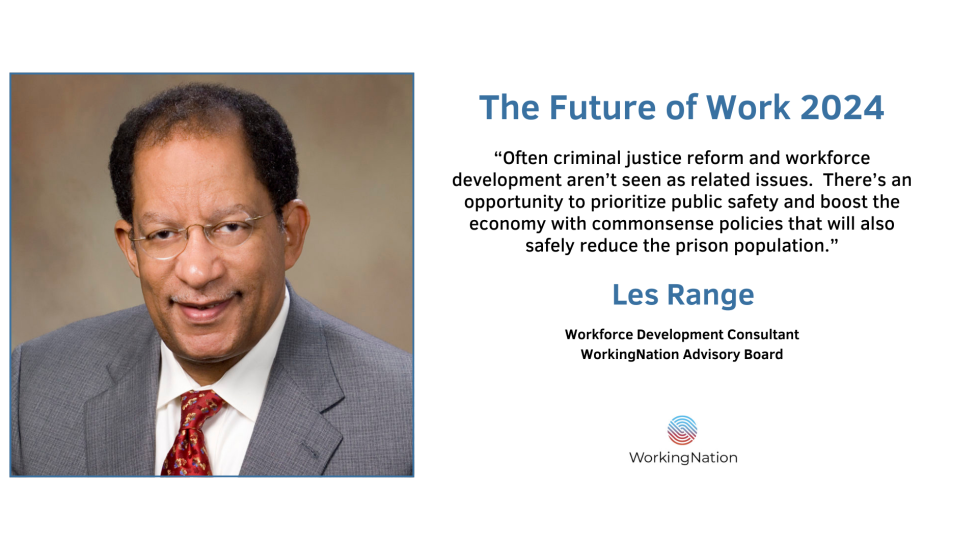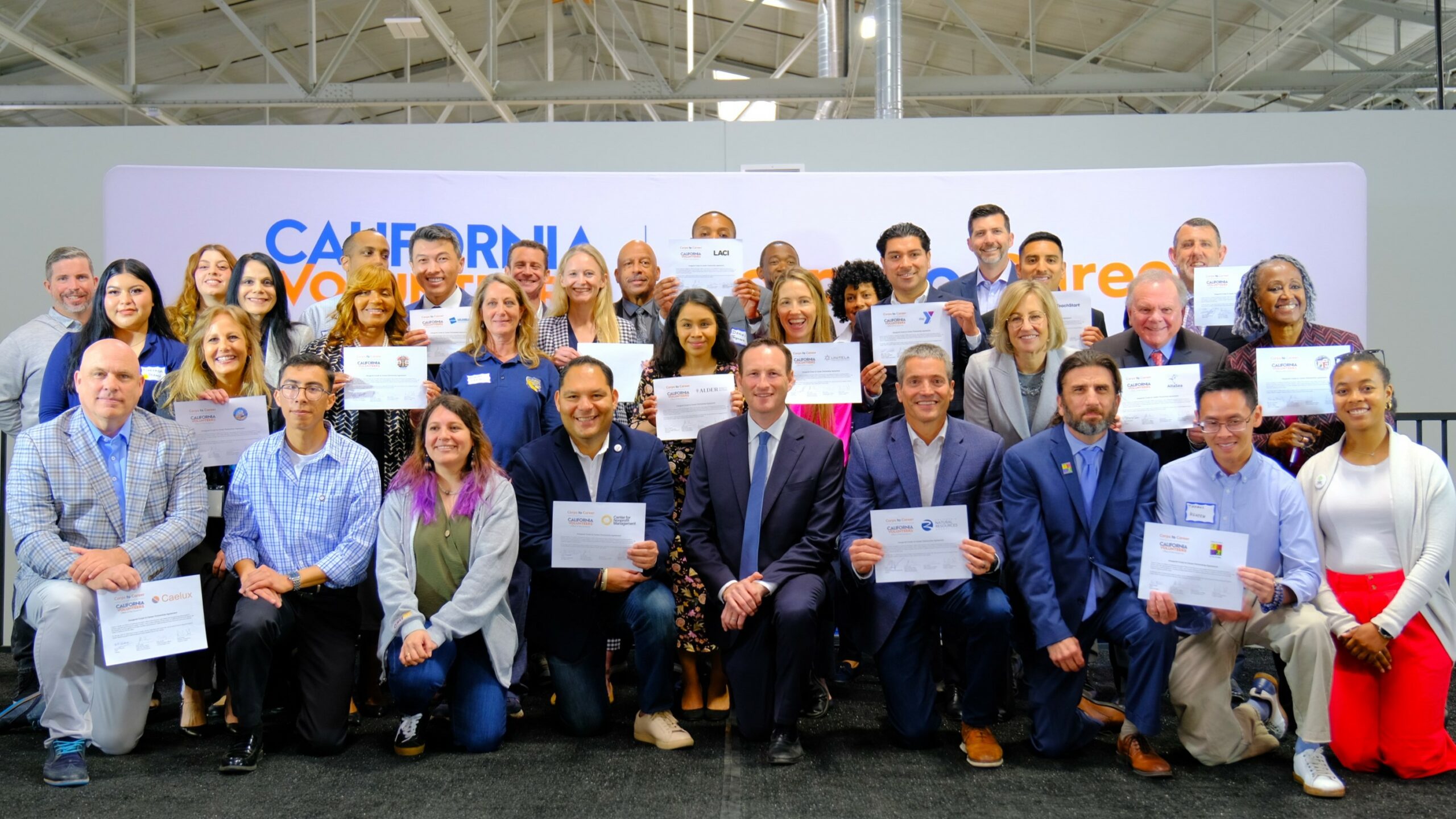We asked our WorkingNation Advisory Board to share their thoughts on the most important issues and challenges facing the workforce and the labor market in 2024.
Les Range has had a long career in workforce development and currently works as an independent consultant.
Here are his thoughts on The Future of Work 2024.

“Last year, I mentioned my interest in finding ways to meaningfully engage justice-involved youth and adults in the workforce system. I indicated that I hoped to further explore programs and models that help expand the pool of workers who are available to meet the needs of employers, especially those that have been having trouble filling their positions in the current post-pandemic environment. I was fortunate to connect with FWD.us Education Fund, Inc. to begin exploring how criminal justice reform might strengthen a state’s economy and workforce.
“Right now, there is an opportunity to unlock great potential in a state like Mississippi to help it reach its full potential. A recent report from FWD.us shows that Mississippi has the highest imprisonment rate in the country, while simultaneously having the lowest labor force participation rate. Often criminal justice reform and workforce development aren’t seen as related issues. However, the data reveals that Mississippi’s criminal justice system is holding back both the economy and the workforce. There’s an opportunity to prioritize public safety and boost the economy with commonsense policies that will also safely reduce the prison population.
“Currently, an estimated one in four Mississippi adults – more than 660,000 people – have a criminal conviction – making it more difficult to look for or get a job in their local communities. Not only is Mississippi imprisoning more people per capita than any other state in the country, but also the high costs associated with continuing down this path drains critical resources better spent attracting new industries and investing in economic development.
Just last year, the state legislature appropriated more than $400 million to run the state’s prison system. If, for example, Mississippi had the imprisonment rate of nearby states, it could save significant taxpayer dollars. Mississippi would save approximately $60 million per year if it had Louisiana’s imprisonment rate, and $220 million per year if it had Tennessee’s imprisonment rate.
The economic impact of the state’s criminal justice system is felt on a micro and macro level in terms of economic losses. For instance, people who have been to prison are also grossly underemployed experiencing a 52% reduction in annual earnings over those who have not been incarcerated. Looking at the losses in annual earnings for people who have misdemeanor convictions, felony convictions, or have been to prison, the state collectively loses an estimated $2.7 billion due to lost earnings and $95 million in lost tax revenue.
“Not only do formerly incarcerated people experience an unemployment rate of 27%, nearly five times higher than the overall population, but the substantial barriers and discrimination faced even before an interview cause harm to individuals and Mississippi’s economy.
These barriers make finding a job and taking care of one’s family harder. They also have tremendous negative impacts on the success of small businesses throughout the state. Although Mississippi has made recent strides to implement effective public safety strategies while controlling the costs associated with the state’s prison system – unfortunately, there has been limited long-term success.
“Mississippi cannot address the current workforce shortage or sustain the strong long-term economic development Mississippians deserve, without also addressing the state’s dangerously high prison population. Ultimately, as the data shows, incarceration is one of the most expensive and least effective public safety strategies to create a stronger Mississippi for everyone.
“According to the Society for Human Resource Management (SHRM), 81% of business leaders and 85% of HR professionals believe workers with criminal records execute their jobs ‘about the same or better’ than workers without criminal records. However, in Mississippi, many of these people are excluded from the workforce. There is an opportunity to expand and increase fairness in hiring practices, which would also help to raise employment in Mississippi.
“The state recently reported an estimated 85,000 job openings – three times as many as a decade ago – meaning there were nearly two job openings for every person in Mississippi actively looking for employment. To put that in perspective, even if every person looking for a job in Mississippi found one, there would still be 40,000 jobs unfilled. States that have safely reduced their imprisonment rates over the last decade, including nearby states like Texas, Oklahoma, and Louisiana, have also experienced a reduction in crime rates three times faster than states whose imprisonment rates have gone up.
It’s not too late for action. But the time to make these vital changes is now. The more people who are home, in their communities, reunited with their families, and contributing to their local businesses, the stronger and healthier our workforce and economy become.
“There must be data-driven, evidence-based policy solutions to help safely reduce the prison population. Looking back to past reforms and encouraging the elected leaders to fully implement past policies, like the use of earned supervision credits for people who no longer need to be on probation or parole, is one needed step.
In addition, Mississippi must continue to advance additional policy changes that will address the state’s long sentences such as ensuring the continuation of the recent parole expansion, reducing penalties for simple drug possession, and changing the state’s harsh habitual sentencing laws. These are all ways that taxpayer dollars can be redirected to invest in proven public safety strategies and expand opportunities for people impacted by the criminal justice system.
“Policymakers should also continue to follow the data and use data-driven, proven solutions that demonstrate progress. Reducing barriers for applicants with criminal convictions to obtain occupational licenses has begun to bridge the gap in accessibility, but there is more work to be done to create wider access. There has also been progress with the expansion of parole, enabling more incarcerated people to demonstrate rehabilitation and have a meaningful chance at release.
“Establishing an inclusive workforce, with job training opportunities, access to acquire occupational licenses, and fewer barriers to re-enter the workforce, all set the stage for people to apply for and accept meaningful jobs throughout Mississippi.
“Continuing to advance solutions to safely reduce incarceration and offering individuals a chance to reach their full potential will reap enormous benefits to the state’s economy, workforce, and local communities.”
Read more from our WorkingNation Advisory Board members on The Future of Work 2024.











